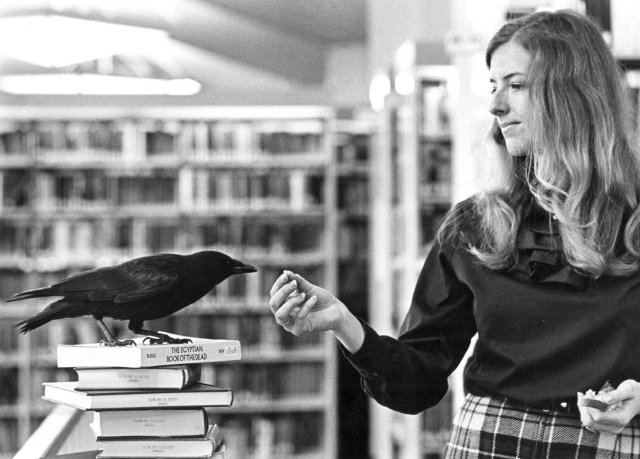Clovis the Library Crow
A bird who moved into CSM’s library became a 1970s symbol of freedom and resistance
In 1971-72, CSM students struggling to study amid protest, economic uncertainty and the lingering Vietnam War found an unlikely hero in a crow who moved into the soaring College Heights library and refused to leave.
Clovis, as he became known, was first spied on campus in fall 1971. Curious but initially shy of people, he observed college life from various high perches before settling into the library, whose 40-foot ceilings and splendid tall windows fulfilled his species’ need to see and be seen.
Before long, Clovis made friends with library regulars and staff.

“He’s a big fellow, but he’s good-natured,” said John Dooley, head of CSM’s library services. “Doesn’t really give anybody a bad time.”
Dooley acknowledged that he should probably get rid of Clovis – “the droppings problem, you know” – but it was tough to evict a bird who’d wormed his way into people’s hearts, and who evaded or ignored all efforts to rehome him.
“He’s just too smart to fall for tricks like that,” said library staffer Judy Hitt.
Clovis recognized people, and also their mental states. Somehow he sensed who was cramming furiously for a test and would buzz their bent heads, cawing. Library workers played with him and fed him treats. He loved to knock over Styrofoam cups and logroll atop their sides like a frisky lumberjack.
Occasionally Clovis would leave the library to roam outside, but he would soon peck on the windows to be let back in.
The Peninsula Humane Society arrived just before New Year’s 1972 to trap Clovis and set him free. Clovis watched the crew set a baited pigeon trap to catch him, but never went near the thing.
On January 27, 1972, a local newspaper photographed Clovis thoughtfully posed atop a stack of books and accepting treats from Hitt. The photos and accompanying story were picked up by the Associated Press and published all over the United States.
Three weeks later, Clovis was found dead, the apparent victim of poison.
“Clovis was a rebel in a society that doesn’t care much for a rebel,” mourned student Craig A. Walker in the campus San Matean. “But because everyone cheers for the underdog, or the underbird in this case, everyone was rooting for Clovis. It somehow seems, though, that the rebel, or the radical, or any label they conjure up, loses in the end. And so it was with Clovis.
“This bird made CSM famous for a while. We all felt a certain amount of affection and we all identified with him in our own ways. ... May we all remember him for what he did for CSM: He lifted up our spirits when we needed it the most.”

